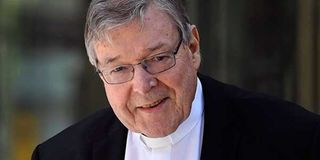Cardinal Pell: Australia's disgraced top Catholic cleric

Australian Cardinal George Pell. From country priest to trusted top Vatican insider and now convicted prisoner, Cardinal Pell could spend the rest of his life in jail after being sentenced on Wednesday to six years for child sex offences. PHOTO | | WILLIAM WEST | AFP
What you need to know:
- He was in December found guilty of sexually assaulting two choirboys in Melbourne in the 1990s.
- Cardinal Pell was subsequently sentenced to six years in jail, with no possibility of parole before late 2022.
- From the pulpit, and publicly, Pell espoused traditional Catholic values.
SYDNEY
From country priest to trusted top Vatican insider and now convicted prisoner, Cardinal George Pell could spend the rest of his life in jail after being sentenced on Wednesday to six years for child sex offences.
Tall and physically imposing even in old age, eloquent yet plainspoken, 77-year-old Pell was the charismatic embodiment of orthodox Australian Catholicism.
He was in December found guilty of sexually assaulting two choirboys in Melbourne in the 1990s, and subsequently sentenced to six years in jail, with no possibility of parole before late 2022.
FAILING HEALTH
In handing down the sentence, Chief Justice Peter Kidd acknowledged that Pell's age and deteriorating health meant the jail term "carries with it a... possibility that you may not live to be released from prison".
Born in 1941, Pell grew up in Ballarat, a rural Australian gold rush town of lore about 100 kilometres (62 miles) from Melbourne.
He was a keen member of his college debating team, a lead actor in school productions and a champion Australian rules footballer.
His devout Catholic mother was reportedly pleased that her son decided to pursue a career in the Church.
His father, an Anglican, was bewildered that he turned down a contract from one of the country's top Australian football teams.
Having chosen a religious path, Pell completed part of his studies in Rome before being ordained as a priest for the Ballarat diocese in 1966.
RISING STAR
As his star rose, he went on to become Archbishop of Melbourne and then Sydney at the behest of Pope John Paul II.
In 2003 he was named to the Vatican's powerful College of Cardinals, a position that allowed him to vote in the conclaves that elected popes Benedict and Francis.
In 2014, he was handpicked by Pope Francis to make the church's finances more transparent.
At home, he was considered a religious and conservative hero with a tough stance on euthanasia and gay marriage, while rejecting climate science.
Former conservative Australian prime minister Tony Abbott was effusive in his praise: "Cardinal Pell is one of the greatest churchmen that Australia has seen."
From the pulpit, and publicly, Pell espoused traditional Catholic values.
RUMOURS
But over the years he was the subject of multiple rumours and accusations of serious wrongdoing.
He fervently denied claims that he covered up abuse by priests in Victoria state where he worked.
A national inquiry into child sex abuse in Australia between 1950 and 2010 found that seven percent of Catholic priests were accused of abuse, but that the allegations were never investigated.
The inquiry heard that 4,444 alleged incidents of paedophilia were reported to church authorities and that in some dioceses more than 15 percent of priests were perpetrators.
PAEDOPHILE PRIESTS
Repeatedly questioned during hearings about paedophile priests in the Ballarat diocese in the 1970s and 80s, Pell apologised on behalf of the church but insisted he had no memory of claims of sustained mistreatment.
He did, however, admit he "mucked up" in dealing with paedophile priests in the 1970s, but said he was deceived by senior clergy about what was happening during a time of "crimes and cover-ups".
In a 2016 interview, he described dealing with the allegations and questions about his character as "very, very difficult and very upsetting" but maintained his innocence.
Then the finger of blame turned squarely on him.
SENTENCED
He was accused and ultimately sentenced in December 2018 on a series of charges linked to the assault of two boys in Melbourne, who were aged 13 at the time.
All the while he was gradually edged out of Vatican life – with the church taking advantage of a court-ordered veil of secrecy to remove him from top bodies with little explanation.
Shortly after his conviction, Pell was removed from the so-called C9 Council of Cardinals that are effectively the Pope's cabinet and inner circle of advisors.
The Vatican dropped him as the Church's finance chief and opened its own probe into his actions after his conviction was made public in February.
The investigation could result in a canonical trial and Pell's eventual expulsion from the priesthood.
In Australia, he may retain some diehard support, but for his critics he remains the embodiment of an Australian institution that has failed its congregation and the country.





